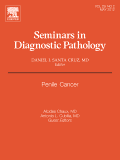
SEMINARS IN DIAGNOSTIC PATHOLOGY
Scope & Guideline
Elevating standards in diagnostic pathology education.
Introduction
Aims and Scopes
- Diagnostic Pathology of Neoplasms:
The journal covers a wide range of neoplastic conditions, particularly focusing on the diagnostic challenges and advancements in understanding various tumors, including salivary gland tumors, germ cell tumors, and lymphoproliferative disorders. - Immunohistochemistry and Molecular Pathology:
There is a significant emphasis on the use of immunohistochemical techniques and molecular pathology to improve diagnostic accuracy and prognostic assessments in various cancers. - Emerging Diagnostic Techniques:
The journal highlights new diagnostic methodologies, including artificial intelligence and machine learning applications in pathology, providing insights into how these technologies can enhance diagnostic processes. - Clinical Implications of Pathological Findings:
Each publication often discusses the clinical ramifications of pathological diagnoses, aiming to bridge the gap between laboratory findings and patient management. - Genetic Syndromes and Tumor Pathology:
The journal also explores the association between hereditary syndromes and their pathological manifestations, particularly in renal and hematological malignancies.
Trending and Emerging
- Advancements in AI and Machine Learning:
There is a growing trend towards integrating artificial intelligence and machine learning into pathology, with numerous articles exploring their applications for improving diagnostic accuracy and efficiency. - Focus on Rare Tumors and Complex Cases:
Recent themes indicate an increasing interest in rare tumors and complex diagnostic cases, particularly in the context of genetic syndromes and their pathological implications. - Detailed Exploration of IgG4-related Diseases:
There has been a notable increase in publications related to IgG4-related diseases, reflecting a growing recognition of their complexity and the diagnostic challenges they present. - Personalized Medicine in Oncology:
The journal is increasingly focusing on personalized approaches to cancer treatment, emphasizing the role of molecular profiling and tailored therapies in diagnostic pathology. - Interventional Cytopathology:
Emerging interest in interventional cytopathology techniques is evident, particularly regarding the role of cytopathologists in performing procedures and real-time diagnostics.
Declining or Waning
- General Pathology Topics:
There has been a noticeable decline in publications focusing on general pathology themes, suggesting a shift towards more specialized and complex topics rather than broad overviews. - Traditional Cytopathology Techniques:
The focus on classical cytopathology techniques, such as FNA (Fine Needle Aspiration) and conventional cytological methods, has decreased, indicating a move towards more advanced methodologies and technologies. - Non-neoplastic Conditions:
The journal has seen fewer articles addressing non-neoplastic conditions, possibly due to a growing emphasis on cancer pathology and diagnostics. - Basic Histopathology:
Topics centered around basic histopathological techniques and descriptions have become less frequent, as there is a stronger trend towards integrating advanced molecular techniques and AI in diagnostic processes.
Similar Journals

Pathologie
Unveiling the Complexities of Pathological ProcessesPathologie is a distinguished academic journal published by Springer Heidelberg, dedicated to advancing the field of pathology and forensic medicine. With an ISSN of 2731-7188 and an E-ISSN of 2731-7196, this journal serves as a vital platform for researchers, professionals, and students to disseminate innovative findings and insights. Currently ranked in the Q3 category of pathology and forensic medicine according to the 2023 metrics, Pathologie reflects a commitment to quality and relevance in a dynamic research landscape. Despite its relatively recent establishment from 2022, the journal is gaining traction with a Scopus rank of 139 out of 208 in its category, positioning itself as an emerging resource within the academic community. While it operates under a subscription model, the importance of the journal lies in its objective to facilitate the exploration of diverse pathological processes and enhance forensic methodologies, ultimately improving clinical outcomes and investigative practices. As it continues to grow, Pathologie stands poised to impact the pathology domain significantly.
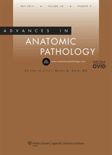
ADVANCES IN ANATOMIC PATHOLOGY
Leading the Charge in Anatomical Advancements.ADVANCES IN ANATOMIC PATHOLOGY is a leading peer-reviewed journal dedicated to the field of anatomical pathology, published by LIPPINCOTT WILLIAMS & WILKINS. With an impressive impact factor and consistent ranking in the Q1 category for both Anatomy and Pathology and Forensic Medicine, it serves as an essential resource for researchers, clinicians, and students alike. The journal has been a critical platform for disseminating significant findings and advancements in the discipline since its inception in 1996, boasting Scopus rankings of #1 in Anatomy and #11 in Pathology. While it does not provide open access, it maintains rigorous standards in the selection of articles, ensuring that published research reflects the latest developments and techniques in the field. As we look toward 2024 and beyond, ADVANCES IN ANATOMIC PATHOLOGY remains committed to advancing the science of pathology, fostering innovation, and enhancing clinical practice through impactful research.
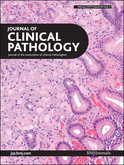
JOURNAL OF CLINICAL PATHOLOGY
Elevating Standards in Diagnostic ExcellenceJOURNAL OF CLINICAL PATHOLOGY, published by BMJ PUBLISHING GROUP, stands at the forefront of advancements in the field of clinical pathology, offering a platform for groundbreaking research and insights from 1948 to the present. With an impressive impact factor and categorized as Q1 in both Medicine (miscellaneous) and Pathology and Forensic Medicine for 2023, the journal holds a distinguished position in the academic community, ranking 22nd out of 208 journals in its category on Scopus and representing the 89th percentile. While the journal does not currently offer open access, it remains a vital resource for researchers, healthcare professionals, and students seeking to stay current with innovative methodologies, clinical techniques, and diagnostic advancements. Located in London, United Kingdom, the journal aims to bridge the gap between laboratory findings and clinical practice, emphasizing the importance of evidence-based pathology in improving patient care and treatment outcomes. Engage with the JOURNAL OF CLINICAL PATHOLOGY to enhance your understanding and contribute to the evolving landscape of clinical pathology research.
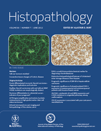
HISTOPATHOLOGY
Exploring Innovations in Histology and PathologyHISTOPATHOLOGY is a premier scholarly journal published by WILEY, targeting the fields of histology, pathology, and forensic medicine. With an ISSN of 0309-0167 and an E-ISSN of 1365-2559, this esteemed journal has maintained a strong academic presence since its inception in 1977. Boasting an impressive Q1 ranking in crucial categories such as Histology and Pathology, it ranks 13th out of 208 in Pathology and Forensic Medicine, and 5th out of 62 in Histology, reflecting its high impact and relevance within the scientific community. HISTOPATHOLOGY serves as a critical platform for disseminating significant research findings, reviews, and advancements in the diagnostic and therapeutic aspects of pathology. Although it does not operate under an open access model, its rigorous peer-review process ensures that published articles uphold the highest standards of scientific integrity. Scholars and practitioners alike benefit from the insights shared in this journal, as it aims to bridge the gap between laboratory science and clinical practice, fostering innovation and enhancing our understanding of disease mechanisms.

AJSP-Reviews and Reports
Catalyzing Future Research Developments in PathologyAJSP-Reviews and Reports is a peer-reviewed journal dedicated to the advancement of knowledge within the field of pathology and forensic medicine. Published by the renowned Lippincott Williams & Wilkins, this journal plays a vital role in disseminating insightful reviews and reports that contribute to the understanding and application of diagnostic practices and forensic investigations. While currently listed in the fourth quartile (Q4) within its category according to the 2023 metrics, the journal is committed to enhancing its impact and fostering scholarly dialogue among researchers, professionals, and students in the medical community. Despite challenges in Scopus rankings, it provides a platform for significant discourse and innovation in pathology. Operating from the United Kingdom, AJSP-Reviews and Reports is positioned to bridge gaps in knowledge and inspire future research developments. Readers can access valuable findings without open access barriers, allowing for efficient information sharing within the medical field.

APPLIED IMMUNOHISTOCHEMISTRY & MOLECULAR MORPHOLOGY
Elevating research standards in laboratory science.Applied Immunohistochemistry & Molecular Morphology, published by Lippincott Williams & Wilkins, stands as a pivotal resource within the fields of histology, medical laboratory technology, and pathology. With an ISSN of 1541-2016 and an E-ISSN of 1533-4058, this journal has been contributing significant research and advancements since its inception in 1996. It serves a diverse audience, including researchers, professionals, and students, aiming to enhance the understanding of immunohistochemical techniques and molecular morphology. Recognized for its quality, it holds category quartiles of Q3 in histology and Q2 in medical laboratory technology and pathology and forensic medicine as of 2023. The journal's rigorous peer-review process ensures that only the most impactful findings are disseminated, thus advancing the education and practice in these critical domains of study. Though it is not an open-access journal, it remains essential for keeping abreast of the latest methodological innovations and applications in pathology and laboratory science, as evidenced by its respectable Scopus rankings and the continual convergence of groundbreaking research published through 2024.
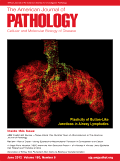
AMERICAN JOURNAL OF PATHOLOGY
Leading the Way in Pathological Discoveries Since 1946American Journal of Pathology, published by Elsevier Science Inc, is a premier academic journal that has significantly contributed to the field of pathology since its inception in 1946. With an ISSN of 0002-9440 and an E-ISSN of 1525-2191, this esteemed journal is recognized for its rigorous peer-review process and high-quality research publications. Currently classified in the Q1 quartile of the Pathology and Forensic Medicine category, it ranks impressively at #9 out of 208 in Scopus, positioning it within the top 5th percentile of journals in its field. The American Journal of Pathology serves as a vital resource for researchers, clinicians, and students, offering cutting-edge insights and critical research findings that drive advancements in diagnostic and therapeutic strategies. As a non-open access journal, it ensures the dissemination of high-quality content while maintaining a dedicated subscriber base. With a commitment to excellence, this journal is an essential platform for anyone involved in pathology and forensic studies, paving the way for innovative research that addresses the complex challenges within the medical field.

Diagnostic Pathology
Advancing Pathology Through Open Access ResearchDiagnostic Pathology is a prominent open-access journal published by BMC, dedicated to advancing the field of pathology by providing a platform for high-quality research findings since its inception in 2006. Based in the United Kingdom, the journal covers a broad spectrum of topics within the realms of histology, pathology, and forensic medicine, facilitating discussions that are crucial for both clinical and laboratory settings. With an impressive impact factor that places it in the Q2 category across multiple categories including Histology and Miscellaneous Medicine, it ranks favorably in Scopus with notable positions in the 71st and 55th percentiles for Pathology and Histology respectively. As a valuable resource for researchers, professionals, and students alike, Diagnostic Pathology promotes the dissemination of cutting-edge studies and findings, thereby contributing significantly to the evolving landscape of medical science. The journal’s commitment to open access enhances its accessibility, ensuring that valuable research is freely available to a global audience.
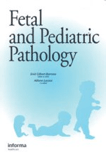
Fetal and Pediatric Pathology
Connecting research and practice for healthier futures.Fetal and Pediatric Pathology, an esteemed journal published by TAYLOR & FRANCIS INC, is dedicated to advancing the field of pediatric and fetal medicine through the dissemination of high-quality research and clinical insights. With an ISSN of 1551-3815 and an E-ISSN of 1551-3823, the journal has been a key resource for researchers and practitioners since its inception in 1983. Based in the United Kingdom, it covers a broad spectrum of topics relevant to Medicine, Pathology and Forensic Medicine, and Pediatrics, Perinatology, and Child Health, consistently reflecting on contemporary challenges faced in these fields. The journal has attained a commendable Q3 ranking within its categories as of 2023, underlining its relevance in the academic community. Though not an open-access publication, the research presented in Fetal and Pediatric Pathology plays a pivotal role in informing practice, guiding future studies, and enhancing the understanding of diseases affecting fetuses and children. Its convergence of research throughout multiple years, continuing until 2024, marks it as a crucial platform for ongoing scientific dialogue and innovation, aimed at fostering better health outcomes for younger populations.
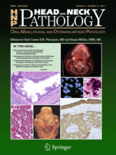
Head & Neck Pathology
Unveiling the Mysteries of Head & Neck HealthHead & Neck Pathology is a leading journal dedicated to advancing the study of pathologies affecting the head and neck region, published by Springer. With an ISSN of 1936-055X and E-ISSN of 1936-0568, this journal serves as a vital resource for the dissemination of research in oncology, otorhinolaryngology, and pathology, achieving impressive rankings of Q2 in Oncology and Q1 in both Otorhinolaryngology and Pathology & Forensic Medicine in 2023. Since its inception in 2007, Head & Neck Pathology has continued to provide a platform for innovative research findings, case studies, and reviews, fostering a deeper understanding of head and neck diseases. The journal's commitment to excellence is reflected in its rigorous peer-review process and accessibility through various academic platforms. Researchers, clinicians, and students will find valuable insights and knowledge that can enhance clinical practice and improve patient outcomes in the dynamic field of head and neck pathology.